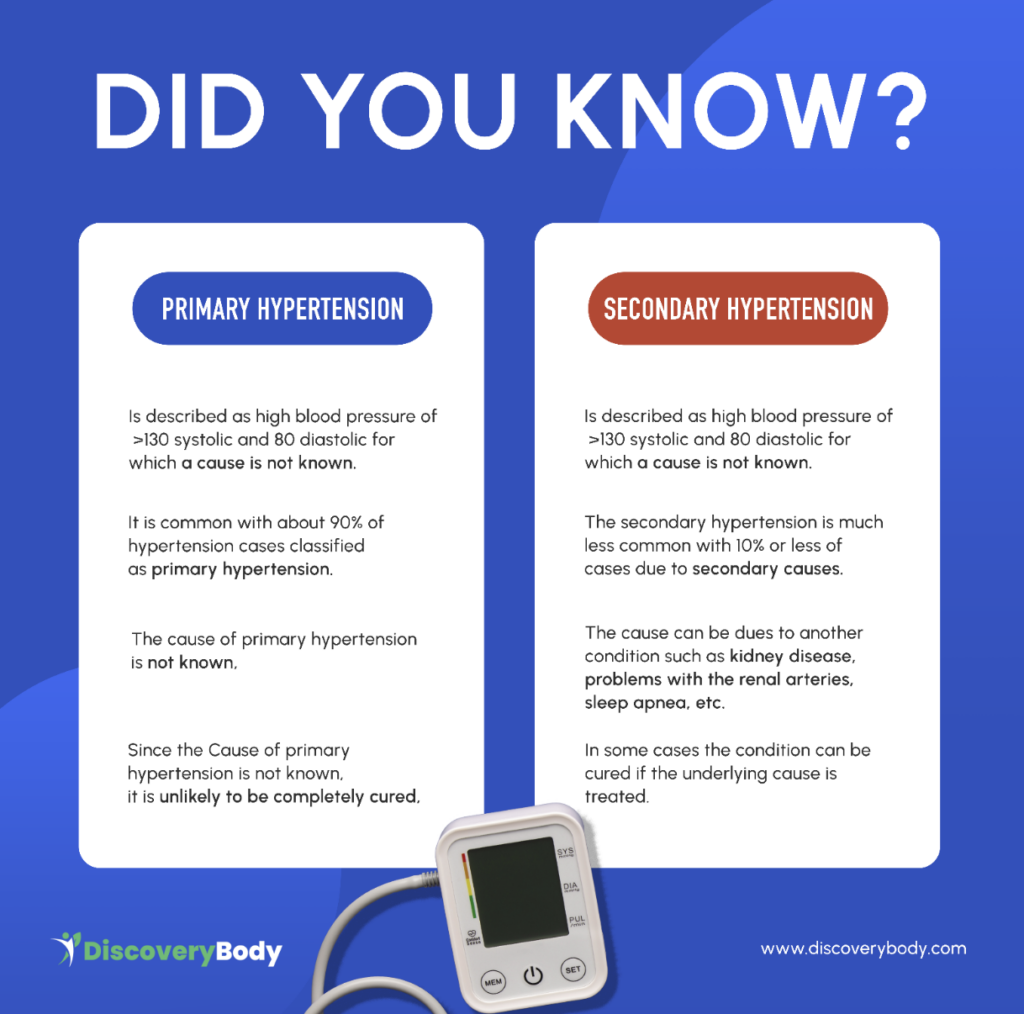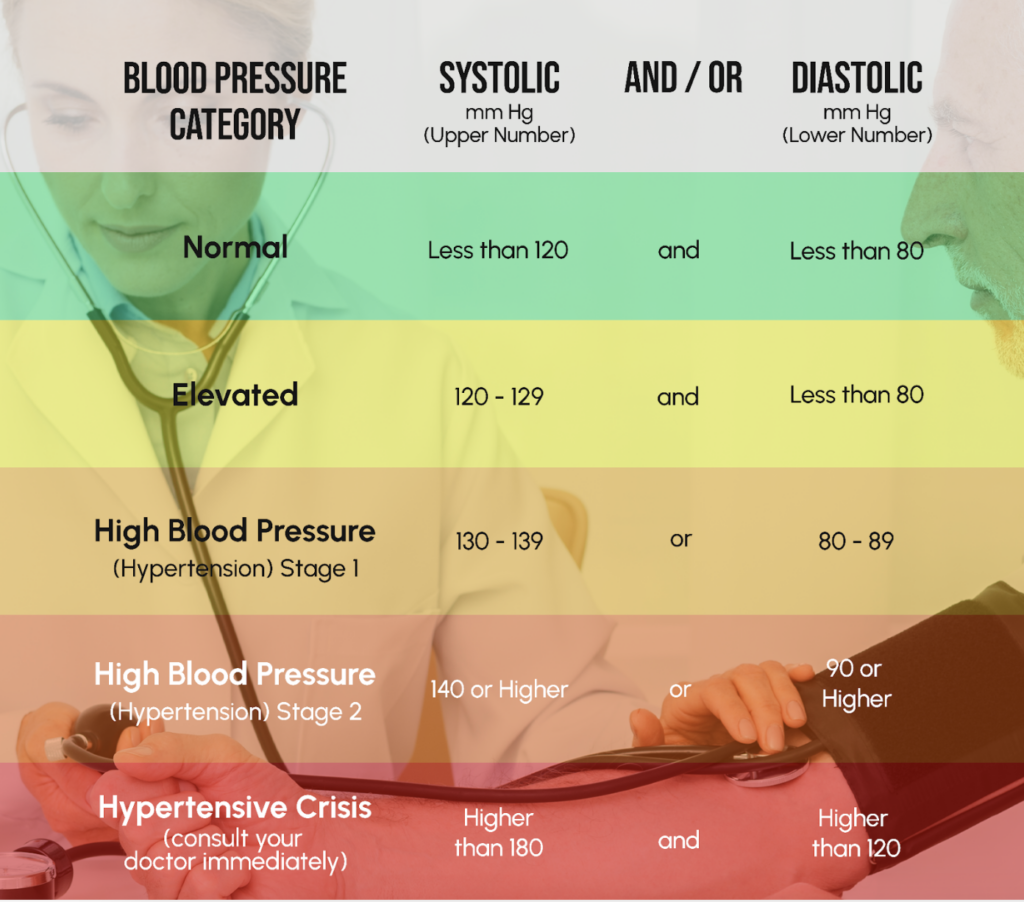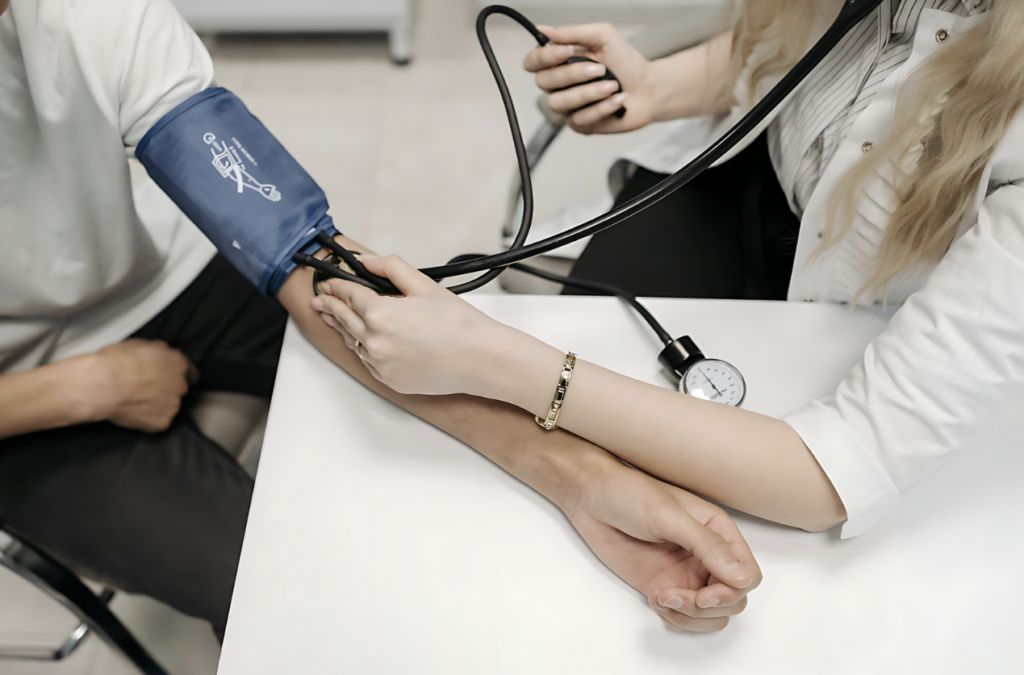Medically Accredited
What is Hypertension? Everything To Know About This Silent Killer
Hypertension, commonly known as high blood pressure, is a serious health condition that affects millions of people worldwide. Despite its prevalence, many individuals remain unaware of their condition because of its asymptomatic nature. However, untreated hypertension can lead to severe complications such as stroke, heart attack, and kidney disease. What is hypertension? Read on to learn more about its causes, symptoms, treatment, and how to live well despite having this condition.
What is Hypertension?
Hypertension, also known as high blood pressure, is a medical condition characterized by consistently elevated blood pressure levels. Blood pressure is the force exerted by blood against the walls of the arteries as the heart pumps it throughout the body. It’s measured using two numbers: the systolic pressure (the top number) and the diastolic pressure (the bottom number). A blood pressure reading of 130/80 mmHg or higher is considered high and indicative of hypertension.
The Centers for Disease Control and Prevention estimated that hypertension was a primary or contributing cause of 691,095 deaths in the United States alone in 2021. The World Health Organization (WHO) also reports that hypertension affects more than 1.2 billion people globally between the ages of 30 and 79, with 2 out of 3 living in low- or middle-income countries.
What are the Symptoms of Hypertension?
The Silent Nature of Hypertension
One of the most concerning aspects of high blood pressure is its silent nature. This is why it is often referred to as the “silent killer.” Most individuals with hypertension do not experience any symptoms, which is why regular checkups are important. However, when blood pressure reaches extremely high levels, it can lead to symptoms such as headaches, heart palpitations, and nosebleeds. These symptoms may indicate a hypertensive crisis, requiring immediate medical attention.
Recognizing Symptoms of a Hypertensive Crisis
A hypertensive crisis occurs when blood pressure readings reach 180/120 mmHg or higher. At this level, individuals may experience severe symptoms such as shortness of breath, chest pain, blurry vision, heart palpitations, anxiety, dizziness, nosebleeds, vomiting, and more. If you or someone you know is experiencing these symptoms, it is important to seek emergency medical care immediately.
What are the Types of Hypertensions and their Causes?

Primary Hypertension
Primary hypertension, also known as essential hypertension, is the most common type of high blood pressure, accounting for approximately 90% of all adult cases in the United States. This type of hypertension develops gradually over time. It’s influenced by a combination of genetic and lifestyle factors. Risk factors for essential hypertension include:
- Genetics: Some individuals may have a genetic predisposition to hypertension due to gene mutations or inherited abnormalities from their parents.
- Age: The risk of developing hypertension increases with age, particularly after 65 years.
- Race: Black non-Hispanic individuals have a higher incidence of hypertension.
- Obesity: Living with obesity can contribute to various cardiac issues, including hypertension.
- High alcohol consumption: Regularly consuming more than one drink per day for women and more than two drinks per day for men may increase the risk of hypertension.
- Sedentary lifestyle: A lack of physical activity and lower fitness levels have been linked to hypertension.
- Diabetes and metabolic syndrome: Individuals with diabetes or metabolic syndrome have a higher risk of developing hypertension.
- High sodium intake: Daily high sodium intake, exceeding 1.5 grams per day, has a small association with hypertension.
Secondary Hypertension
Secondary hypertension accounts for approximately 10% of high blood pressure cases and is caused by an underlying medical condition or medication. It occurs suddenly and is often more severe than primary hypertension. Several medical conditions and factors can contribute to the development of secondary hypertension, including:
- Certain medications: Some medications, such as immunosuppressants, nonsteroidal anti-inflammatory drugs (NSAIDs), and oral contraceptives (the pill), can increase blood pressure levels.
- Kidney disease: Kidney problems can affect blood pressure regulation, leading to hypertension.
- Obstructive sleep apnea: Sleep disorders, such as sleep apnea, can contribute to the development of high blood pressure.
- Primary aldosteronism (Conn’s syndrome): This condition is characterized by the overproduction of the hormone aldosterone, leading to increased blood pressure.
- Recreational drug use: Substances like amphetamines and cocaine can cause a sudden increase in blood pressure.
- Renal vascular diseases: Conditions that affect blood flow in the kidneys, such as renal artery stenosis, can contribute to hypertension.
- Tobacco use: Smoking and using tobacco products can raise blood pressure levels.
What are the Complications of Hypertension?
Untreated hypertension can lead to a range of serious health complications. Prolonged high blood pressure puts excessive strain on the heart, blood vessels, and organs throughout the body. Over time, this can result in the following conditions:
- Cardiovascular Disease: Hypertension increases the risk of developing conditions such as coronary artery disease, stroke, heart attack, and peripheral artery disease.
- Kidney Disease: Elevated blood pressure can damage the blood vessels in the kidneys, leading to kidney disease and, in severe cases, kidney failure.
- Pregnancy Complications: Pregnant women with hypertension are at a higher risk of developing complications such as preeclampsia, which pose risks to both the mother and the baby.
- Eye Damage: Hypertension can damage the blood vessels in the eyes, leading to vision problems or even blindness.
- Vascular Dementia: Chronic high blood pressure can increase the risk of developing vascular dementia, a type of dementia caused by impaired blood flow to the brain.
How Do Healthcare Providers Diagnose Hypertension?
Measuring Blood Pressure
Diagnosing hypertension involves taking a blood pressure reading as part of the initial assessment. Healthcare providers diagnose high blood pressure by measuring it with an arm cuff, commonly known as a sphygmomanometer. Blood pressure is measured using two numbers: systolic blood pressure (the top number) and diastolic blood pressure (the bottom number). The systolic blood pressure represents the pressure on your artery walls when your heart beats or contracts, while the diastolic blood pressure measures the pressure on your artery walls between beats when your heart is at rest. Healthcare providers measure blood pressure in millimeters of mercury (mmHg).
Blood Pressure Categories
The American College of Cardiology and the American Heart Association have established blood pressure categories to guide diagnosis and treatment. These categories are based on systolic and diastolic blood pressure readings. The categories are as follows:

In the United States, a high blood pressure diagnosis means your top number is at least 130 mmHg and/or your bottom number is at least 80 mmHg. It’s important to note that blood pressure guidelines may vary slightly depending on the country and age (blood pressure readings may differ for children and teenagers).
The Importance of Regular Checkups
A single blood pressure reading rarely leads to a diagnosis of hypertension. Additional readings over a few days or weeks may be required to confirm the diagnosis. It’s because blood pressure levels can fluctuate throughout the day, and environmental factors, such as stress, can affect readings. Therefore, it’s important to establish evidence of constant high blood pressure before diagnosing hypertension.
In addition to blood pressure readings, healthcare providers may perform other tests, such as cholesterol screening, electrocardiograms (EKG), ultrasounds of the heart or kidneys, and home blood pressure monitoring over a 24-hour period. These tests help identify underlying conditions and assess the impact of high blood pressure on organs.
Early treatment and monitoring are important for managing hypertension and reducing the risk of complications, and it’s possible only with regular checkups. Once diagnosed, treatment plans can be tailored to the individual, considering factors such as the severity of hypertension, the presence of underlying conditions, and the patient’s overall health.
What’s the Management and Treatment of Hypertension?
The treatment for high blood pressure typically involves a combination of lifestyle changes and, in some cases, medication. The specific treatment plan will depend on the type of hypertension and the underlying causes identified.
Lifestyle Changes/Home Remedies for Hypertension
In many cases, lifestyle changes can help lower blood pressure without the need for medication. If your blood pressure is only slightly elevated or falls within the stage 1 hypertension category, healthcare providers may recommend starting with lifestyle changes. Here are some proven ways to naturally lower blood pressure:
- Heart-Healthy Diet: Adopting a diet rich in fruits, vegetables, whole grains, and lean proteins like fish can contribute to lower blood pressure and reduce the risk of complications. The Dietary Approaches to Stop Hypertension (DASH) eating plan is often recommended for individuals with hypertension. This diet is low in sodium and saturated fats, making it beneficial for blood pressure control.
- Physical Activity: Regular exercise, such as brisk walking, swimming, or cycling, can help lower blood pressure naturally and strengthen the cardiovascular system. The Centers for Disease Control and Prevention (CDC) recommend aiming for 150 minutes of moderate physical activity per week.
- Weight Management: Maintaining a healthy weight through a balanced diet and regular physical activity is crucial for managing hypertension. Individuals with obesity can significantly lower their blood pressure levels with weight loss. Aim for a body mass index (BMI) within the normal range, which is generally between 18.5 and 24.9.
- Stress Management: Stress can contribute to elevated blood pressure. Engaging in stress-reducing activities such as meditation, deep breathing exercises, massage, muscle relaxation techniques, and yoga can help manage stress levels.
- Reduced sodium intake: For optimal blood pressure control, the American Heart Association recommends keeping sodium intake below 1,500 milligrams per day. Start by gradually reducing your daily intake by at least 1,000 milligrams. To reduce sodium intake, start to read more food labels, try home-cooked meals, and avoid processed and packaged foods that are often high in sodium. For flavor, opt for fresh, whole foods seasoned with herbs and spices.
- Increasing potassium intake: Aim to consume 3,500 to 5,000 milligrams of potassium per day through food sources such as bananas, avocados, and potatoes.
- Moderate alcohol consumption: If you choose to drink alcohol, do so in moderation. Women should limit their consumption to one drink per day, while men should limit their intake to two drinks per day.
Medications for Hypertension
In some cases, lifestyle changes alone may not be sufficient to control blood pressure, or the condition may be more severe. In such instances, healthcare providers may prescribe medication to help manage hypertension. Commonly, healthcare providers use a variety of medications to treat high blood pressure.
- Beta-blockers: These medications slow the heart rate and reduce blood pressure by blocking certain hormones that can raise blood pressure.
- Diuretics: Diuretics, also known as water pills, help the kidneys remove excess sodium and water from the body, reducing blood volume and lowering blood pressure.
- ACE Inhibitors: Angiotensin-converting enzyme (ACE) inhibitors prevent the production of angiotensin, a chemical that causes blood vessels to tighten. By relaxing blood vessels, ACE inhibitors help lower blood pressure.
- Angiotensin II Receptor Blockers (ARBs): ARBs block the action of angiotensin II, preventing it from binding to receptors in blood vessels. This blood vessel relaxation helps to lower blood pressure.
- Calcium Channel Blockers: These medications prevent calcium from entering the cardiac muscles of the heart and blood vessels, leading to lower blood pressure levels.
- Alpha-2 Agonists: Alpha-2 agonists work by changing the nerve impulses that cause blood vessels to constrict, resulting in blood vessel relaxation and decreased blood pressure.
It’s important to consult with your healthcare provider to determine the most appropriate medication and dosage. Medication may need to be adjusted over time to achieve optimal blood pressure control and minimize side effects.
Alternative Treatments for Hypertension
In addition to conventional treatments, some individuals may explore complementary and alternative approaches to managing hypertension. These may include:
- Mind-Body Techniques: Techniques such as meditation, deep breathing exercises, and yoga can help reduce stress and lower blood pressure.
- Biofeedback: Biofeedback involves using electronic devices to monitor and provide feedback on physiological processes, such as heart rate and blood pressure, allowing individuals to learn how to control these processes.
- Acupuncture: Acupuncture, an ancient Chinese practice, involves inserting thin needles into specific points on the body to stimulate energy flow and promote overall well-being.
- Herbal Supplements: Researchers have studied the potential blood pressure-lowering effects of some herbal supplements, including garlic extract, hawthorn, and fish oil. However, it is important to consult with a healthcare professional before starting any herbal supplements, as they may interact with medications or have other side effects.
It’s important to discuss any complementary or alternative approaches with a healthcare provider to ensure their safety and effectiveness in managing hypertension.
Promising Treatment Approaches
Researchers are exploring several promising treatment approaches for the management of hypertension. These include:
- Renal denervation: A procedure that involves using radiofrequency energy to disrupt the nerves that contribute to high blood pressure.
- Baroreceptor activation therapy: A device-based treatment that stimulates the baroreceptors (pressure sensors) in the neck to lower blood pressure.
- Novel antihypertensive medications: Researchers are developing new drugs that target specific mechanisms involved in hypertension, such as vasodilation or sodium excretion.
It’s important to note that these treatment approaches are still being researched and may not be widely available or suitable for all individuals with hypertension. Consultation with a healthcare provider is important to explore the most appropriate treatment options based on individual needs and circumstances.
Frequently Asked Questions About Hypertension
Can hypertension be cured?
Primary (essential) hypertension cannot be cured. It is a lifelong condition that can be controlled through lifestyle modifications and medication. However, high blood pressure due to another medical condition (secondary hypertension) can sometimes be cured if the underlying disease is resolved.
Can supplements or foods lower blood pressure?
While studies have shown that some dietary approaches, like the DASH diet, can naturally lower blood pressure, there is insufficient evidence to support the effectiveness of other dietary methods. It is important to consult with your healthcare provider before relying solely on supplements or specific foods to manage your blood pressure.
Is it better to measure blood pressure while seated or lying in bed?
For accurate blood pressure measurement, it is recommended to sit comfortably in a chair with a backrest, your feet placed firmly on the floor, and your arm placed on a table. This position helps ensure consistent and reliable readings.
How can we start preventing hypertension early in life?
Preventing hypertension early in life involves adopting a healthy lifestyle. This includes maintaining a healthy weight, engaging in regular physical exercise, and avoiding a high-salt diet from childhood.
Do all individuals with hypertension require medication?
Lifestyle modifications, such as diet and exercise, may be sufficient for moderate hypertension. However, if these measures are not enough, there is a wide range of medications available for the treatment of high blood pressure. Your healthcare provider will determine the appropriate medication and dosage based on your needs.
Can we combine hypertension medications with other drugs?
It’s important to be aware that certain medications, such as nasal decongestant drops, some syrups, or anti-inflammatories, can interfere with antihypertensive medication. It’s important to consult with your healthcare provider to ensure that medications are compatible and do not interact unfavorably.
Be Proactive
Remember, hypertension may be silent, but with the right knowledge and proactive measures, you can take control of your blood pressure and your overall health. So be proactive! Maintain a healthy lifestyle, do regular checkups, and learn more about “what is hypertension.” Early detection and prevention are the key factors in fighting this condition.
Disclaimer: Please note that Discoverybody has taken great care to ensure that all information provided is comprehensive and up to date. However, you should not use this article as a substitute for the expertise that a licensed healthcare professional can offer. It’s always a good idea to talk to your doctor before taking any medication.
12 Sources Expanded:
- Facts about hypertension. Centers for Disease Control and Prevention. (2023, July 6). https://www.cdc.gov/bloodpressure/facts.htm
- Hypertension. World Health Organization: WHO & World Health Organization: WHO. (2023, March 16). https://www.who.int/news-room/fact-sheets/detail/hypertension
- High blood pressure symptoms, causes, and problems. Centers for Disease Control and Prevention. (2023, August 29). https://www.cdc.gov/bloodpressure/about.htm
- Samson, M., MD. (n.d.-b). Hypertension: Practice Essentials, background, pathophysiology. https://emedicine.medscape.com/article/241381-overview
- Why High Blood Pressure is a “Silent Killer.” American Heart Association. (2023, May 31). https://www.heart.org/en/health-topics/high-blood-pressure/why-high-blood-pressure-is-a-silent-killer
- Iqbal AM, Jamal SF. Essential Hypertension. [Updated 2023 Jul 20]. In: StatPearls [Internet]. Treasure Island (FL): StatPearls Publishing; 2024 Jan-. Available from: https://www.ncbi.nlm.nih.gov/books/NBK539859/
- Charles, L., Triscott, J., & Dobbs, B. (2017, October 1). Secondary hypertension: Discovering the underlying cause. American Family Physician. https://www.aafp.org/pubs/afp/issues/2017/1001/p453.html
- Types of blood pressure medications. American Heart Association. (2024, February 26). https://www.heart.org/en/health-topics/high-blood-pressure/changes-you-can-make-to-manage-high-blood-pressure/types-of-blood-pressure-medications
- National Heart, Lung, and Blood Institute. Your Guide to Lowering Your Blood Pressure With DASH [PDF – 792K]. NIH Pub. No. 06-4082. Bethesda, MD: National Heart, Lung, and Blood Institute; 2006. https://www.nhlbi.nih.gov/files/docs/public/heart/new_dash.pdf
- Ahuja, R., Ayala, C., Tong, X., Wall, H. K., & Fang, J. (2018). Public Awareness of Health-Related Risks from Uncontrolled Hypertension. Preventing Chronic Disease, 15. https://www.cdc.gov/pcd/issues/2018/17_0362.htm
- Guirguis-Blake, J. M., Evans, C. V., Webber, E. M., Coppola, E. L., Perdue, L. A., & Weyrich, M. S. (n.d.). Table 1, Blood Pressure Classifications – Screening for hypertension in Adults: An Updated Systematic Evidence Review for the U.S. Preventive Services Task Force – NCBI Bookshelf. https://www.ncbi.nlm.nih.gov/books/NBK570233/table/ch1.tab1/
- Nahas R. (2008). Complementary and alternative medicine approaches to blood pressure reduction: An evidence-based review. Canadian family physician Medecin de famille canadien, 54(11), 1529–1533. https://www.ncbi.nlm.nih.gov/pmc/articles/PMC2592323/




